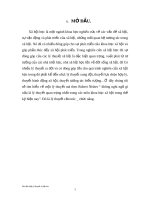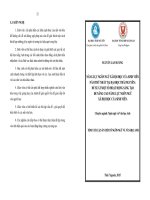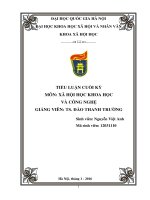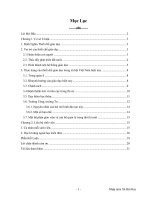TIỂU LUẬN NGÔN NGỮ XÃ HỘI HỌC
Bạn đang xem bản rút gọn của tài liệu. Xem và tải ngay bản đầy đủ của tài liệu tại đây (140.21 KB, 11 trang )
HUE UNIVERSITY
INSTITUTE OF OPEN EDUCATION
AND INFORMATION TECHNOLOGY
ENGLISH LANGUAGE
--------o0o--------
SOCIOLINGUISTIC PROJECT
Lecturer:
PhD. Trần Thuần
Student’s name:
VÕ THỊ HIỀN LƯƠNG
Student’s code:
7052900497
Class:
Nghệ An 6
Nghe An, July 2023
1
Topic 6 : Compare the English of two informants (non-native
speakers of English), one of whom loves British culture and
one of whom identifies with American culture
BÀI LÀM
Learning English is essential in modern life which we are living in now. Language
acquisition is influenced by various factors, including cultural exposure and
identification. When we study English, we also understand the culture of the
country where people speak English all the time as their mother language. I believe
that some of the learners like British culture besides some of them prefer
researching American culture. In this essay, we will explore and compare their
English proficiency of them by analyzing their language preferences, vocabulary
usage, and accents, we seek to gain insights into how cultural affiliations impact
language learning.
In America and Britain, people both speak English so the learners who love
British culture or who love American culture have numerous things in common.
There is a huge number of words that they use that are the same. American
Language VS. British English The two languages are very similar, so much so that it
is very easy to understand between the two countries. The languages do not need
translation due to writing in what is called standard English. Standard English is the
written English format used in all three countries making it very versatile and easy
to understand. There are only a handful of similarities between American English
and British English. There is more of a difference than there are similarities.
1. HISTORY
The British actually introduced the language to the Americas when they reached
these lands by sea between the 16th and 17th centuries. At that time, the spelling
had not yet been standardized. It took the writing of the first dictionaries to set in
stone how these words appeared. In the UK, the dictionary was compiled by
London-based scholars. Meanwhile, in the United States, the lexicographer was a
man named Noah Webster. Allegedly, he changed how the words were spelled to
2
make the American version different from the British as a way of showing cultural
independence from its mother country.
In terms of speech, the differences between American and British English actually
took place after the first settlers arrived in America. These groups of people spoke
using what was called rhotic speech, where the ‘r’ sounds of words are
pronounced. Meanwhile, the higher classes in the UK wanted to distinguish the
way they spoke from the common masses by softening their pronunciation of the
‘r’ sounds. Since the elite even back then were considered the standard for being
fashionable, other people began to copy their speech, until it eventually became the
common way of speaking in the south of England.
2. SPELLING DIFFERENCES
British and American English have some spelling differences. The common ones
are presented in the table below.
British English
-oe-/-ae- (e.g. anaemia, diarrhoea,
encyclopaedia)
-t (e.g. burnt, dreamt, leapt)
-ence (e.g. defence, offence, licence)
-ell- (e.g. cancelled, jeweller,
marvellous)
-ise (e.g. appetiser, familiarise,
organise)
-l- (e.g. enrol, fulfil, skilful)
-ogue (e.g. analogue, monologue,
catalogue)
American English
-e- (e.g. anemia, diarrhea,
encyclopedia)
-ed (e.g. burned, dreamed, leaped)
-ense (defense, offense, license)
-el- (e.g. canceled, jeweler, marvelous)
-ize (e.g. appetizer, familiarize,
organize)
-ll- (e.g. enroll, fulfill, skillfull)
-og (e.g. analog, monolog, catalog)
*Note that American English also
recognizes words spelled with –ogue
-o (e.g. color, behavior, mold)
-ou (e.g. colour, behaviour, mould)
They have the same meaning but they have different spelling
3. VOCABULARY DIFFERENCES
Although both countries speak English, there are some significant differences in
vocabulary between them. The Americans and the British also have some words
that differ from each other. The table below lists some of the everyday objects that
have different names, depending on what form of English you are using. A
commonly used example is that in the UK we go on “holiday”, but in the USA they
3
are more than likely to have a “vacation”. Also, when the season changes from the
summer, in the UK the next season is known as the “autumn”, with the USA
commonly uses the term “fall”.
Additionally, many words have different meanings depending on which country
you are in; for instance, if in Britain you put on your pants, you mean your
underwear, but in the USA, you would be referring to what the Brits call your
trousers. There are many of these words, some that might cause some
embarrassment, so be careful what you say
British English
American English
trousers
Pants
flat
Apartment
bonnet (the front of the car)
Hood
boot (the back of the car)
Trunk
lorry
Truck
university
College
holiday
Vacation
jumper
Sweater
crisps
Chips
chips
French fries
4
trainers
Sneakers
fizzy drink
Soda
postbox
Mailbox
biscuit
Cookie
chemist
Drugstore
shop
Store
football
Soccer
4. GRAMMAR DIFFERENCES
Aside from spelling and vocabulary, there are certain grammar differences between
British and American English. For instance, in American English, collective nouns
are considered singular (e.g. The band is playing). In contrast, collective nouns can
be either singular or plural in British English, although the plural form is most
often used (e.g. The band are playing).
The British are also more likely to use formal speech, such as ‘shall’, whereas
Americans favour the more informal ‘will’ or ‘should’.
Americans, however, continue to use ‘gotten’ as the past participle of ‘get’, which
the British have long since dropped in favour of ‘got’.
‘Needn’t’, which is commonly used in British English, is rarely, if at all used in
American English. In its place is ‘don’t need to’.
In British English, ‘at’ is the preposition in relation to time and place. However, in
American English, ‘on’ is used instead of the former and ‘in’ for the latter.
5
5. PRONUNCIATION AND ACCENT:
Another difference between British English and American English is pronunciation
of certain words – often due to regional dialects within each country. A classic
example of this is how Brits pronounce the word “tomato”, compared to
Americans who usually pronounce it as “tomayto”, you know the song.
Additionally, accents vary significantly across both countries – from soft Southern
drawls found throughout much of America’s South East region all the way up
through New England where Bostonians have their own accent, which includes
some unique local vocabulary.
Whilst writing, there are also differences between UK and US English. Some
spelling of words with the same meaning are different, for example in the UK there
is “colour”, and in the USA the word is spelled “color”, and there are other words
that drop the “u” in US spelling. Dates are written differently too – while Britons
write day/month/year (01/02/2023), Americans write month/day/year
(02/01/2023).
Language is an important factor to consider when moving from the UK to the
USA. Knowing the differences in vocabulary, pronunciation and accent, and
writing style can help make this transition smoother.
While there may be certain differences between British and American English, the
key takeaway is that the two have more similarities. Accidentally using one instead
of the other will not automatically lead to miscommunication. Americans and Brits
can usually communicate with each other without too much difficulty, so don’t be
too hard on yourself if you are unable to memorize the nuances of both languages.
5, Differences between the UK and USA
In the UK, people are often formal when meeting someone for the first time,
greeting with a handshake, whilst in the USA, people tend to be more informal. It
is also common for Americans to address someone by their first name even if they
have just met them. In the UK it is considered impolite to discuss private matters
such as salary, when meeting someone, so you are more likely to have a
conversation centred around the weather, than how much you earn.
Table Manners and Dining Customs: Table manners in the UK are generally quite
formal compared to those of the US. For example, it is considered impolite in
Britain not to wait until everyone at the table has been served before starting your
meal. In contrast, American dining etiquette tends to be less strict; most people
start eating as soon as their food arrives without waiting for others at the table, and
often at home meals are taken standing up rather than sat at the dinner table.
6
Public behaviour in both countries can vary depending on where you are located,
but there are some general differences between British and American culture that
should be noted when moving from one country to another. For instance, while
British people tend to keep a certain level of formality when interacting with
strangers in public spaces such as shops or restaurants, Americans may appear
more relaxed and friendly towards those they don’t know well yet.
The UK and US have many similarities in social etiquette, but there are also some
subtle differences. It’s important to be aware of these differences when
transitioning to a new country.
6. UNDERSTANDING TIME MANAGEMENT IN THE UK AND USA
The UK and US have similar expectations when it comes to punctuality, deadlines,
workplace schedules, and work- life balance. The US has adopted flexible working
hours which allow employees to start earlier or later depending on their neess.
In both the UK and the USA, punctuality is highly valued. However, in the USA in
some social contexts, such as parties, it is much more acceptable to be late,
although this is becoming more commonplace in the UK (being “fashionably late”)
In business, in both countries, it is expected that people will arrive on time for
appointments or meetings, and deadlines are taken seriously. People who do not
adhere to these expectations may be seen as unreliable or unprofessional.
Workplace Expectations and Schedules: Working hours tend to differ between
countries as well; while most workplaces in both countries operate from 9 am-5 pm
during weekdays, many businesses in the US have adopted flexible working hours
which allow employees to start earlier or later depending on their needs. This type
of schedule isn’t quite as common in the UK yet but could become more popular
over time as attitudes towards work-life balance continue to shift, as well as
increased remote working.
Attitudes towards time management can vary greatly between the UK and the
USA, from punctuality to workplace expectations.
7. COMPARING THE POLITICAL SYSTEMS AND GOVERNMENTAL
STRUCTURES OF THE UK AND USA
The political systems of the UK and the USA are vastly different, with each
country having its own unique leadership styles, policies, voting rights, laws, and
regulations.
Differences in Leadership Styles and Policies
7
In the UK, a constitutional monarchy is in place where the reigning monarch is the
Head of State but has limited powers. The Prime Minister leads the government
while Parliament makes laws that apply to all citizens. In contrast, the US has a
federal system of government with an elected President as Head of State who holds
executive power over both state and federal governments. Congress is responsible
for making laws which are then enforced by state governments.
Voting Rights, Laws, Regulations & Freedoms of Speech / Press / Religion etc…
In both countries there are universal voting rights granted to citizens aged 18 or
older; however, in some states within America there can be restrictions on certain
groups such as felons or those without permanent residency status. Both countries
have freedom of speech enshrined in their constitutions but other freedoms vary
between them, and due to the process involved UK law can be changed much more
easily than US law. Similarly, assembly and petitioning rights differ between
Britain’s Human Rights Act 1998 (which includes peaceful protest) compared to
America’s Bill of Rights (which includes public assemblies).
Although the political systems and government structures of the UK and USA have
some similarities, there are also many significant differences in leadership styles,
policies, voting rights and freedoms.
Different Approaches to Education: Comparing the UK and USA
The primary school curriculum in the UK and US differ significantly. In the UK,
pupils are required to study a range of core subjects such as English, Maths,
Science and Humanities. They also have access to a wide variety of extracurricular activities such as music, art, and sport. In contrast, US schools focus
more on developing academic skills with an emphasis on literacy and numeracy.
Students may also be able to choose from elective courses that vary depending on
their state or district.
Secondary School Curriculum Differences: At the secondary level there is again a
marked difference between the two countries’ curricula. The UK system requires
students to take exams at age 16 (GCSEs) before moving onto A Levels or
equivalent qualifications at 18 years old for university entry requirements in most
cases. Meanwhile in the US students will typically follow a college preparatory
program which includes taking SAT/ACT tests for college admission purposes
along with completing coursework relevant to their chosen field of study e.g.,
science or business-related courses, etc
Higher Education System Differences: When it comes to university education,
often known as a college in the USA, there are some differences. One is the time
8
that it usually takes to complete a degree, with a 3-year bachelor’s course in the
UK compared to 4 years in the USA. This continues through a master’s (1 year in
the UK compared to 2 years in the USA) and a PhD (3-4 years vs 5-7 years). In the
UK universities are usually lecture-based, in some cases with one final exam,
whilst in the USA there is more likely to be various projects and papers throughout
the course.
For a deeper dive into the similarities and differences between the UK and US
education systems, check out our article on Understanding the Education System in
the USA
8. US VS USA CULUTUAL DIFFERENCES
Is American and British culture the same?
No, American and British culture are not the same. While they share some
similarities due to their historical ties, they also have distinct differences in their
traditions, customs, and values. For example, the British tend to have a reserved
and formal demeanor, while Americans are known for their friendliness and
informality. Additionally, there are differences in cuisine, fashion, and social
norms between the two cultures.
How is the UK culture different to the US culture?
The UK and US cultures differ in many ways. In the UK, people tend to be more
reserved and polite than their American counterparts. The British also have a
strong sense of tradition, with an emphasis on history and heritage. In contrast,
Americans are often seen as more open-minded and outspoken when it comes to
expressing opinions or beliefs. Additionally, the US has a much larger population
than the UK which can lead to different attitudes towards diversity and
immigration. Finally, while both countries share similar language roots there are
still some distinct differences between British English and American English
which can cause confusion for those moving from one country to another.
How can you tell the difference between UK and US people?
The main difference between UK and US people is in their culture, language, and
lifestyle. In the UK, English is the primary language spoken and British culture is
heavily influenced by its long history. The US has a more diverse population with
many different languages spoken throughout the country. Additionally, American
lifestyles tend to be more individualistic than those of the UK which are often
focused on community values. Finally, there are distinct differences in government
systems between both countries that have an impact on how they operate. By
9
understanding these differences, it is possible to tell the difference between UK
and US people.
How does American society differ from British society?
American society differs from British society in many ways. In the US,
individualism is highly valued and encouraged, while in Britain there is a greater
emphasis on community and collective responsibility. The US also has a more
diverse population than the UK, with people of different races, religions, and
backgrounds living side by side. Americans are generally more optimistic about
their future prospects than Britons are; this can be seen in their attitudes toward
work, education, and politics. Finally, American culture tends to be much more
informal than British culture; for example, dress codes tend to be less strict in the
US compared to the UK.
9. SUMMING UP THE CULTURAL DIFFERENCES BETWEEN THE UK
AND AMERICA
In conclusion, the cultures in the USA and UK can be quite different. From
language to social etiquette, attitudes towards time management, political system,
and government structure, and education systems; there are many differences
between these two countries. However, with a little bit of research and
understanding of both cultures, you can adjust to these cultural differences easily.
Understanding the culture comparison: UK vs USA is key for successful
international relocation.
Are you looking to move internationally and need help with shipping? 1st Move
International can provide the solutions you are searching for. We
offer international removals, moving overseas, and shipping services from the UK.
Our team of experienced professionals will help your transition to living in the
USA as stress-free and seamless as possible by looking after your household
goods, furniture, and personal effects. Contact us today to get started on making
your international dreams come true.
10
11









